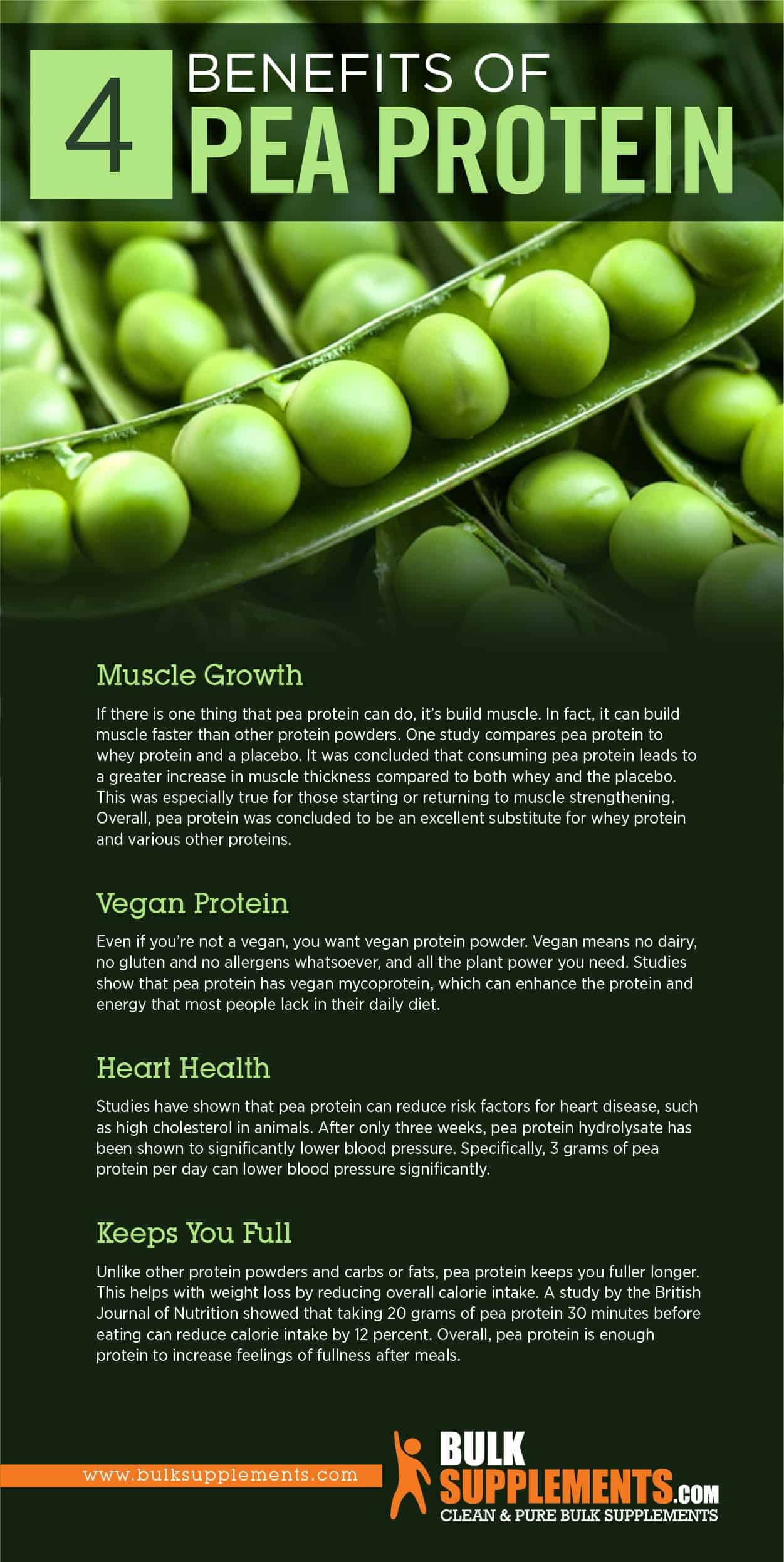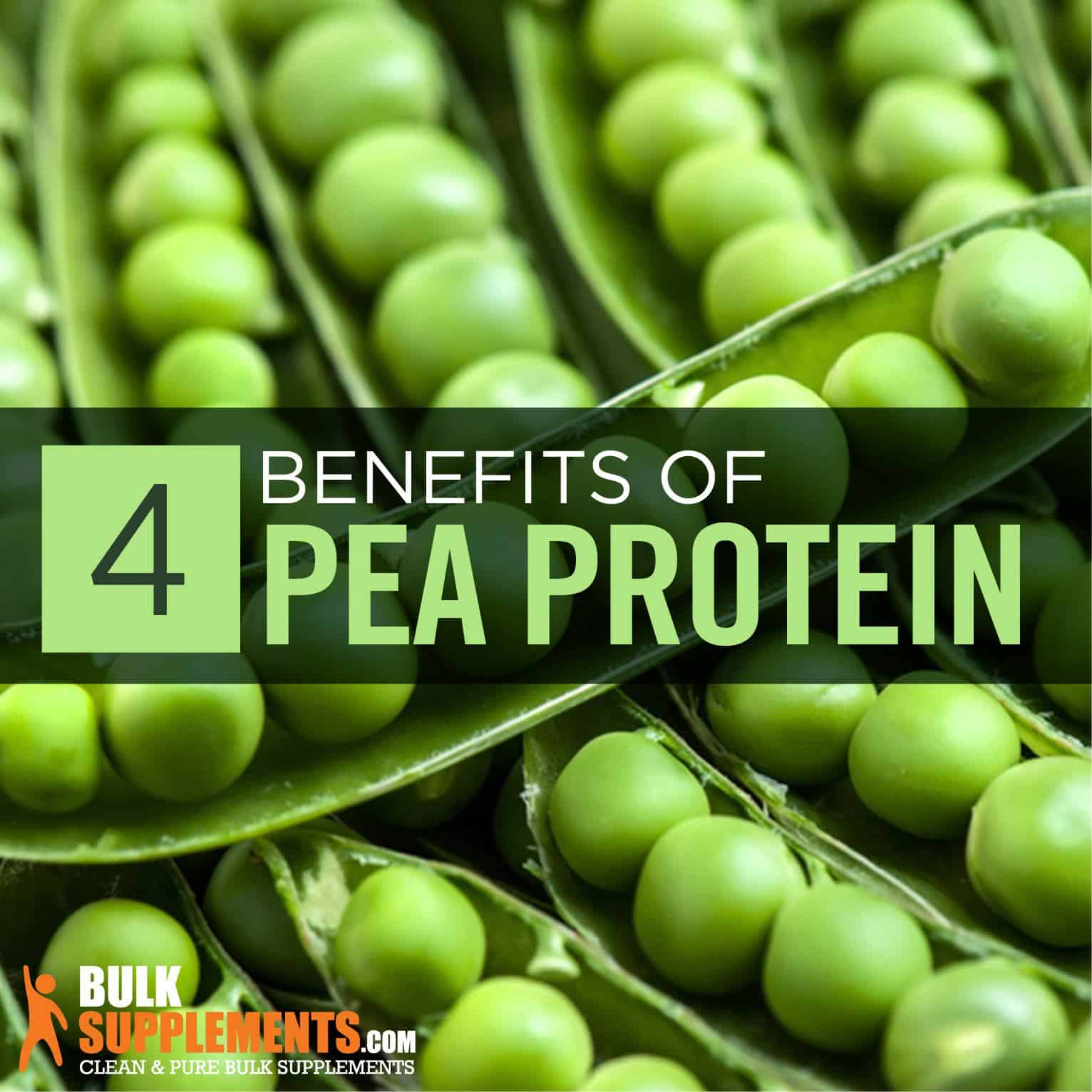I’m sure you’re wondering—what on earth is pea protein powder? The answer is as simple and as literal as it sounds. Pea protein is a type of protein made from peas and research suggests it may increase muscular strength and help the body build muscle faster.
How is that important for you and your overall health? Pea protein is created from the extract of yellow peas and used as an oral supplement. It has potential lasting effects on overall general health, especially as it relates to exercise and dietary wellness. Pea proteins are said to promote muscle mass during resistance training (x). While the origins of who discovered pea protein are mostly vague, several studies have attested to the overall effects of pea protein on muscle endurance.
Pea protein could be what you’re looking for if you’ve been wanting to take your muscle strength to the next level. The supplement is great for vegans, non-vegans and those who suffer from dairy allergies.
What is Pea Protein?
When people discuss protein powder, they usually think of brown rice, whey or soy protein, but pea protein is growing increasingly popular in the athletic community and in the lives of those looking to develop overall healthier immune systems.
How is Pea Protein Powder Made?
Pea protein powder is made from pea extract and it may help the body naturally increase muscle mass faster. It may be a perfect solution for anyone looking to healthily increase the width of their workout routine and enhance their overall workout experience. Pea protein is also found in veggie burgers, snack bars and protein powder (x).
Types of Pea Protein
Pea protein is considered a healthy alternative to whey protein and is divided into five different classes: globulin albumin, prolamin, glutelin and legumin. Each class contributes to the overall benefits of the pea protein in the body.
Globulins are a group of proteins in the blood made in the liver (x). Globulin tests can help diagnose an array of medical conditions including liver and kidney damage or kidney disease, autoimmune disorders, nutritional deficiencies and certain types of cancer.
Albumin is another protein that the liver produces that helps keep fluid in the bloodstream, keeping it from leaking through to other tissues. It also carries several substances throughout the body, including hormones to enzymes (x).
Prolamins are alcohol-soluble storage proteins found in most cereals (x). They are major components of gluten, usually found in bread, cereal and other gluten-related grain products.
Glutelin is another cereal protein that is usually found in the endosperm of some seeds in the grass family. It is also found in rice grains (x).
Legumin, also called vegetable casein, comes from peas (x) and it is a molecule that serves as a major bulk amino acid source in the fertilization of some plants, according to some studies (x).
What is Pea Protein Isolate?
Pea protein isolate is made by cleaning and grinding peas in a dry process until they are a fine powder (x). Starch and fiber are removed from the dried pea powder, creating pea protein isolate. Meat-alternative manufacturers use this powder in several plant-based meats.
What are the Benefits of Pea Protein Powder?
While a pea is notably one of the smallest vegetables we eat, it contains a surprising amount of protein to meet our bodies’ needs. A cup of whole green peas has 8 grams of protein (x). On top of that, protein is a great source of iron and calcium. Additionally, experts consider pea protein a low glycemic food. In addition, it contains no cholesterol, has low saturated fat and it’s easy on the stomach overall. As it relates to you and your diet, though, what is pea protein good for?
Nutrient Composition
According to research, pea protein is a great source of fiber, vitamin K and other naturally occurring minerals promoting overall health in the body. The protein doesn’t contain any dairy, gluten or allergens, making it an option for vegans and non-vegans alike. It may also be an option to those who follow a gluten-free diet. Some studies show that it has vegan mycoprotein, which may help enhance energy and protein in people who lack it in their day-to-day diet (x).
Amino Acid Profile
Most plant foods, including peas, are incomplete protein sources, meaning they are missing one or more of the essential amino acids—histidine, isoleucine, leucine, lysine, methionine, phenylalanine, threonine, tryptophan or valine (x). The body can make nonessential amino acids, but it can’t make essential amino acids. Pea protein is lacking essential amino acids that the body cannot produce on its own with or without the the supplement. Complete proteins, however, contain all essential amino acids in adequate amounts. They are found in seafood, eggs, meats and dairy products. Peas—and therefore pea protein—are high in:
Of the amino acids listed, leucine, isoleucine and valine are branched-chain amino acids, which are essential amino acids that cannot be produced in higher organisms, but are extremely important for humans and animals (x).
Muscle Protein Synthesis
Got muscle? Studies show that pea protein may promote a greater increase of muscle thickness during muscular strength training (x). In fact, some studies show that it may build muscle faster than any other protein powder. This protein can help support the muscles and aid in muscle recovery after strenuous exercise. In a study comparing pea protein to whey protein and a placebo, researchers discovered that it led to a greater muscle thickness than whey protein and the placebo (x). The study concluded that it may be a great substitute for whey protein and other proteins that may not be as effective.

Why Take Pea Protein Powder?
So, why should you consider taking pea protein powder? Imagine yourself eating a candy bar that could naturally elongate your legs for a strenuous, more effective workout. This is the effect that it may have on the muscles. It works in the body to build muscle much faster and more naturally than other proteins.
Taking it as a supplement specifically helps the body absorb the supplement faster and helps the body overall feel whole after a high intensity workout. You should always consult a physician before adding any supplement to your diet.
Pea Protein vs. Whey Protein
In an 8-week pilot study on the effects of pea protein vs. whey protein on high-intensity functional training (HIFT), researchers found that whey and pea protein both promote similar strength, performance, body composition and muscular adaptations (x). The main difference between the two proteins is that it is naturally fat- and cholesterol-free. In another study that compared pea protein to whey protein and a placebo, consuming pea protein lead to a greater increase in muscle mass compared to both whey and the placebo (x).
How to Use Pea Protein Powder
If you’re a bodybuilder, weight lifter or simply looking to increase your protein intake naturally, the powder might be the right supplement for you. It’s packed with amino acids, but because it is incomplete, the product is slightly deficient in methionine and cysteine.
Dosage
Pea protein powder is a vegan alternative to whey protein and is rich in muscle-building amino acids. The supplement comes in two different forms:
Take 30 g with 8 oz. of water or juice. For best results, take it within two hours of exercising. In addition to adding the supplement to a glass of water or juice, you can also take the supplement:
- With oatmeal or other pudding based foods
- Added into your muffin or pancake mix
- If you’re a smoothie lover, blend it into a smoothie
- In a popsicle using popsicle molds
Possible Side Effects of Pea Protein Powder
Pea protein is rich in health benefits, but it also has its side effects, just as any supplement or medication. Although the side effects are generally low, it is typically high in sodium and it may cause weight gain, kidney damage and joint pain. Be sure to consult a doctor before adding this to your everyday health regime. While pea protein powder has vegan properties that are free of dairy and gluten and may help most people taking the supplement, consult a physician to ensure the supplement is safe for you and doesn’t cause any complications with your overall health.
High Sodium
Although it is a protein, pea proteins have a high rate of sodium and sometimes may be too much sodium for the person taking the supplement. Make sure to consult a doctor if you suffer from high blood pressure or other related conditions. While high in sodium, it is significantly lower in fiber and may not cause bloating or flatulence like other protein powders.
Weight Gain
If exercise isn’t a part of your regular routine, like most proteins, taking it may cause you to gain weight. It keeps you full, but may increase the number of calories you consume.
Kidney Damage
If you’re suffering from any kidney related conditions, consult a doctor before taking the supplement. Pea protein, similar to all protein powders, may interfere with kidney health. Consuming too much may impair kidney function and may sometimes increase the risk for kidney disease (x).
Joint pain
Joint pain is also a potential side effect of pea protein, as it is with all protein powders. Researchers note that it is not recommended to consume it if you suffer from gout, as it could increase levels of uric acid in the blood, causing gout to flare up and an overall uncomfortable experience for those suffering from it (x). Make sure to consult a doctor before adding any supplement—including pea protein—to your everyday health routine to make sure the supplement is right for you.
Where to Buy Pea Protein Powder
You can purchase pure pea protein at BulkSupplements.com. The company is an industry-leading manufacturer and distributor for pure dietary supplements. BulkSupplements.com is not just a consumer brand. It also supplies pure ingredients to other food and supplement brands to make their products. All products at BulkSupplements.com are manufactured and tested according to current and proper manufacturing practices.
Are you interested in trying any of the potential benefits that it may offer? Visit BulkSupplements.com to place an order.
Bottom Line
Pea protein is a natural, gluten free supplement that helps the body naturally build muscle thickness faster. If you’re looking to make a lifestyle change and increase muscle mass, this supplement may be the right one for you.
Pea protein has substantial health benefits on the body, including a substantial source of fiber and calcium. Some studies have shown that protein has vegan mycoprotein, which can enhance energy and protein in most people who lack it in their day-to-day diet. The supplement is great for vegans and non-vegans alike, as it doesn’t contain any dairy, gluten or allergens.
Additionally, pea proteins contain a surprising amount of protein to meet our bodies’ needs. A whole cut of green peas having 8 grams of protein (x). Pea proteins are also considered a possible alternative to whey protein. While beneficial and a source of fiber, calcium and protein, pea proteins are incomplete, meaning they are missing one or more of the essential amino acids our body needs.
Consult a doctor before adopting pea protein supplements into your everyday routine. The supplement has side effects that include high sodium levels, possible kidney damage and joint pain. Consult a physician to make sure the supplement is the best alternative for you to use.
**These statements have not been evaluated by the Food and Drug Administration. These products are not intended to diagnose, treat, cure or prevent any disease.


